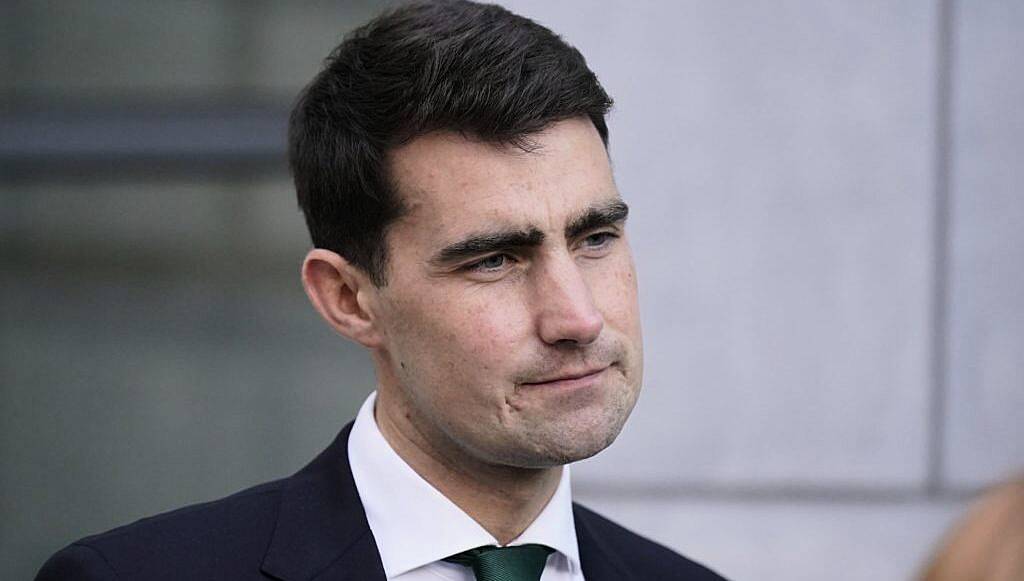Federal Green Party co-leader Jonathan Pedneault was in Whitehorse on Monday, pitching a plan to build a 120,000-person civil defence corps, and expand Canada’s reserve forces.
Pedneault called it a “whole-of-society effort to build resilience, defend our democracy and strengthen our communities.”
Referring to wildfires, a changing climate, “new geopolitical fault lines” and that mysterious balloon that was shot down over Yukon a couple of years ago, Pedneault said it’s clear that Canada is “no longer safe in the ways that it used to be.”
Speaking at a news conference alongside the party’s local candidate Gabrielle Dupont, Pedneault described a national civil defence corps of “well-paid jobs” and priority hiring for former oil and gas sector workers displaced by a move toward a greener economy.
“We want to have a a big force of workers that is spread all across the country that can operate as independently as possible with good-paying jobs and salaries from the federal government, and a clear responsibility to look after the community and be stewards of emergency preparedness,” he said.
He also proposed free civil defence training for any Canadian who wants it.
“Every Canadian, young or old, will have access if they want to basic emergency preparedness skills, first aid, cyber security, crisis response — so that no one should be left behind in case of a blackout, a wildfire or a digital breach,” he said.
He also promised optional defence skills training for “tens of thousands” of Canadians, such as firearms training, survival techniques, and tactical first aid.
“These are tools not just for conflict — and that’s important to strike and emphasize — but they are tools for resilience, for helping neighbours, and for leading in times of crisis,” he said.
“Canada lags behind its democratic allies in terms of civilian readiness.”
Pedneault also promised to expand Canada’s reserve forces by 20,000 people, to fund the expansion of the Canadian Rangers, overhaul the Canadian Service Corps. for youth, and to “place Inuit, Dene, Gwich’in, and other Indigenous nations at the heart of our Arctic Indigenous strategy.”

Pedneault argued that the party’s plan is “not a call for militarization,” but about community readiness.
He also acknowledged that the ambitious plan will cost “tens of billions” of dollars, at a time when other parties are calling for fiscal restraint. Pedneault argues that now is not the time to cut federal spending, but rather to collect more tax from big business.
“It is important to realize the crisis that we’re in,” said Pedneault.
“We need Canadians to know that the state is there to help them get through these hard times, so that Canadians are willing and ready to serve when Canada needs them. And that time may come very soon.”
‘On the front lines’
Dupont, the party’s Yukon candidate, argued that the North is “on the front lines.”
“We’re on the front lines of climate change, we’re on the front lines of energy self-sufficiency, and we’re on the front lines of Arctic geopolitics. Let’s be ready for these challenges,” she said.
The Green Party has struggled to gain a significant foothold in the Yukon, finishing fifth in the riding in the 2021 election with just four per cent of the vote. The party’s best-ever showing in the territory was in 2011, when candidate John Streicker — now a cabinet minister in the territory’s Liberal government — finished third with 18 per cent of the vote.
Pedneault is the first federal party leader to visit the Yukon, or any of the territories, during this federal campaign.
Liberal Leader Mark Carney visited Iqaluit as prime minister earlier this month, before the election call, to announce plans for a new early-warning radar system for the Arctic, along with other infrastructure investments.
NDP Leader Jagmeet Singh and Conservative Leader Pierre Poilievre also visited Iqaluit before the election call.
Singh announced during his visit earlier this month that his party would cancel Canada’s contract to buy U.S.-built F-35s and look for companies to build fighter jets in Canada.
Poilievre, during his visit in February, said his party would double the size of the Canadian Ranger force and build a permanent military base in the Nunavut capital.




